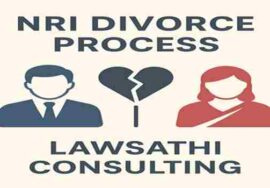
Divorce Procedure and Section 13 of the Hindu Marriage Act, 1955
Introduction
Marriage is a sacred bond in Hindu law, but when the relationship breaks down beyond repair, divorce becomes the only path to peace. The Hindu Marriage Act, 1955, provides a legal framework for divorce among Hindus in India. Understanding Section 13 of this Act is essential for anyone seeking a contested divorce. This section lists the valid grounds for divorce, ensuring that the process remains lawful and just. Divorce Procedure Lawyer in Delhi.
⚖️ What Is Section 13 of the Hindu Marriage Act, 1955?
Section 13 of the Hindu Marriage Act lays down specific reasons (known as grounds) on which either spouse can seek divorce. These reasons include cruelty, adultery, desertion, conversion, insanity, venereal disease, and more. The section ensures that divorce is not granted arbitrarily but only when valid grounds exist.
Key Grounds for Divorce under Section 13
Adultery: If one spouse engages in voluntary sexual intercourse with another person after marriage, it qualifies as adultery.
Cruelty: Any physical or mental harm that makes living together impossible falls under cruelty.
Desertion: When one spouse leaves the other without reasonable cause for a continuous period of two years, it becomes a ground for divorce.
Conversion: If a spouse converts to another religion and ceases to be Hindu, the other spouse can file for divorce.
Unsoundness of Mind: A spouse suffering from incurable mental illness or unsoundness of mind can be a valid reason for divorce.
Leprosy or Venereal Disease: If a spouse is suffering from a communicable or incurable disease, it forms a valid ground.
Renunciation: If one spouse renounces the world and becomes a monk or sanyasi, the marriage can be dissolved.
Presumption of Death: If a spouse has not been heard of as alive for seven years, the other party can seek a divorce.
⚖️ Divorce Process under the Hindu Marriage Act
The divorce process in India differs depending on whether it is a mutual consent divorce or a contested divorce.
Mutual Consent Divorce (Section 13B)
When both husband and wife agree to end the marriage peacefully, they can file a mutual consent divorce under Section 13B.
Steps to Follow: Divorce Procedure Lawyer in Delhi.
Joint Petition Filing: Both spouses file a joint petition before the family court stating mutual agreement to dissolve the marriage.
Cooling-Off Period: A minimum six-month period is provided for reconciliation.
Second Motion: After six months (and within 18 months), both parties appear again, confirming their consent.
Final Decree: The court grants the decree of divorce after satisfying that all terms (alimony, custody, property, etc.) are settled fairly.
Contested Divorce (Section 13)
If one spouse does not consent, the other must prove valid grounds under Section 13.
Steps to Follow: Divorce Procedure Lawyer in Delhi.
Filing of Petition: The aggrieved spouse files a divorce petition in the jurisdictional family court.
Service of Notice: The other spouse receives a court notice and must file a written reply.
Evidence and Arguments: Both parties present witnesses, evidence, and arguments supporting their case.
Judgment: After hearing both sides, the court delivers its judgment and grants a divorce if the grounds are proven.
🏛️ Documents Required for Divorce Filing
Marriage Certificate/ Marriage Invitation Card
Proof of Address and Identity of both parties
Marriage Photos
Proof of Separate Residence
Details of Children (if any)
Evidence supporting grounds (for contested divorce)
💰 Alimony, Maintenance, and Custody
During divorce proceedings, the court may order:
Alimony or Maintenance: Monthly or one-time payment for financial support.
Child Custody: Decided in the best interest of the child.
Property Settlement: Based on mutual agreement or the court’s discretion.
🌐 Jurisdiction of Filing for Divorce
People can file divorce petition in the district or family court where:
The couple last resided together, or
The marriage was solemnized, or
The respondent currently resides.
💬 Frequently Asked Questions (FAQs)
- What is the difference between Section 13 and Section 13B?
Section 13 deals with contested divorce, where one spouse proves legal grounds.
Section 13B covers mutual consent divorce, where both agree to separate.
- Can a spouse withdraw consent after filing under Section 13B?
Yes. Either spouse can withdraw consent anytime before the final decree.
- How long does a divorce take in India?
A mutual consent divorce usually takes 6 to 12 months, while a contested divorce depending on the case’s circumtances.
- Can a divorced person remarry immediately?
Yes, but only after the divorce decree becomes final and the appeal period has passed.
- Is personal appearance required in court?
Yes, both spouses must appear personally for statements, especially in mutual consent divorce cases.
🧠 Conclusion
Divorce under the Hindu Marriage Act, 1955 ensures that separation happens with fairness and legal recognition. Section 13 protects individuals against cruelty, desertion, and other marital injustices. Meanwhile, Section 13B promotes peaceful separation through mutual consent. By understanding these provisions, couples can make informed decisions and proceed lawfully.
🔑 Other Keywords
Divorce process in India, Section 13 Hindu Marriage Act, Grounds for divorce in the Hindu Marriage Act, Mutual consent divorce under Section 13B, Contested divorce process, Divorce lawyer in Delhi, Best family advocate in Delhi, Hindu Marriage Act divorce procedure.
Disclaimer: This article is for educational and informational purposes only. It provides a general understanding of legal remedies but does not constitute legal advice. For specific legal guidance, you can consult a legal expert.



